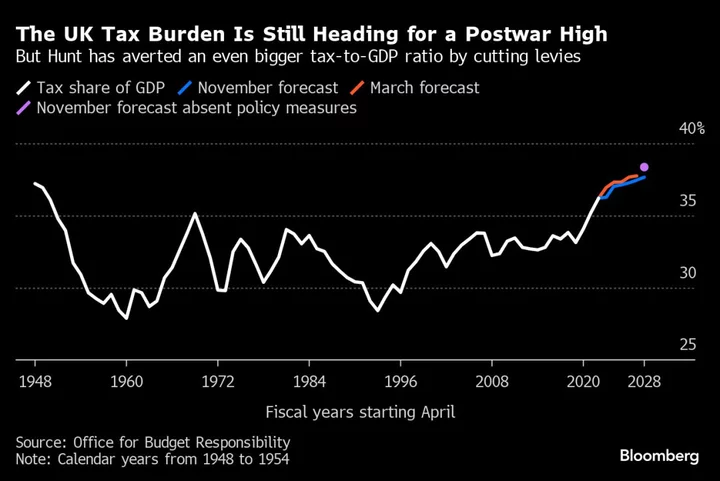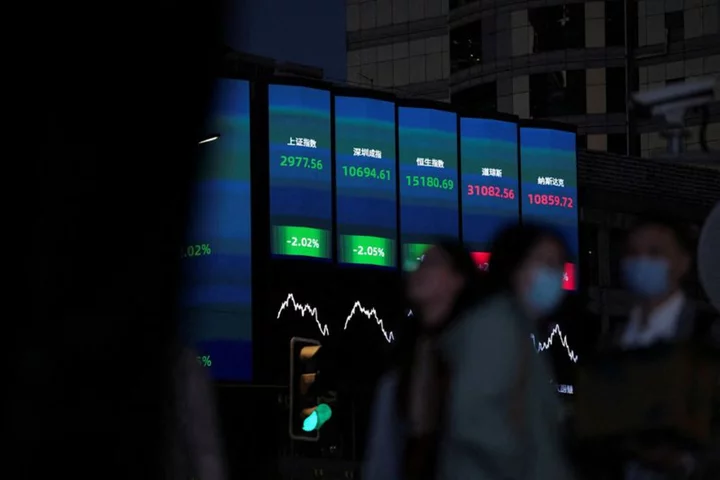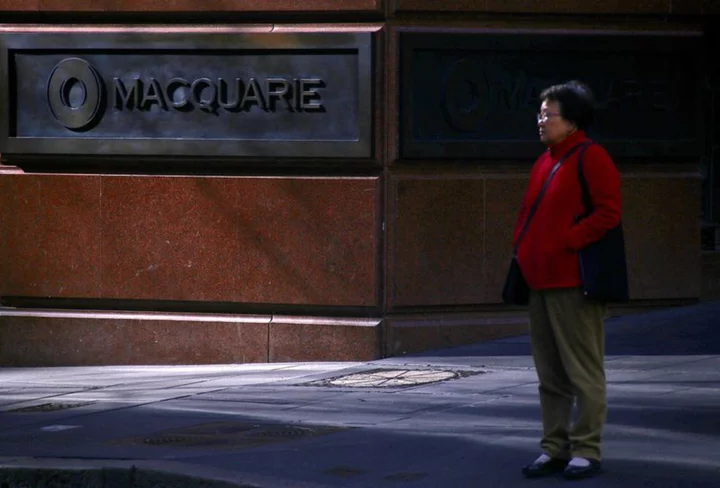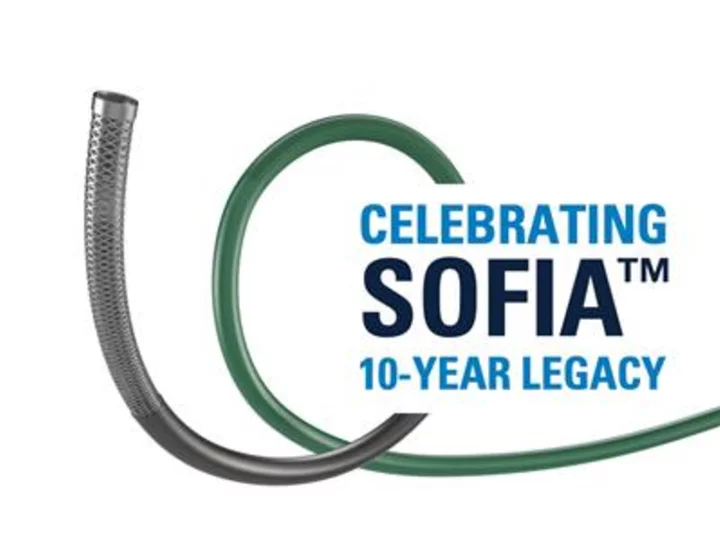Rishi Sunak is planning to decide on further tax cuts and the date of the next UK general election around February, people familiar with his thinking said, as the prime minister’s aides weigh whether to hold a vote in May or later in 2024.
Chancellor of the Exchequer Jeremy Hunt’s Autumn Statement this week sparked speculation that Sunak is mulling an earlier election than expected, thanks to a fast-tracked payroll tax cut to take effect in January rather than April — giving voters the chance to feel the benefits before a spring vote. Hunt’s failure in broadcast interviews to rule out holding his spring Budget sooner than usual stoked the Westminster rumor mill further.
Sunak’s aides have previously suggested he’s planning an election in November 2024, close to the January 2025 deadline for a vote to be held. The conventional wisdom among lawmakers in the governing Conservative Party has been that Downing Street would want a later election to extend Sunak’s time in office, given he only became premier a year ago and opinion polls suggest he is likely to lose power without a huge turnaround in public opinion.
Even if the Tories can’t overturn their polling deficit behind the Labour Party, the timing of a vote could affect the current opposition’s victory margin. Conservative strategists think that if they’re able to close the gap to around 10 points, a May election could see them deny Labour a parliamentary majority. Sunak may then seek to stay on as Tory leader in the hope Labour efforts to form a functioning coalition fail, leading to a second vote.
The prospect of a spring vote, which has been discussed by Sunak’s top team, requires that by February, Britain’s economic fortunes have improved, with inflation falling further and wage growth leaving workers feeling better off.
Some aides worry that delaying an election to the latest possible moment would let Labour accuse Sunak of running scared of voters. There’s also a concern that waiting longer would allow other factors to drag the Tories down, such as the potential for a fresh influx of migrant arrivals by boat over the summer, opening the premier up to more criticism over his inability to control immigration numbers.
Sunak has yet to make a call on the election date and will keep his options open, the people familiar with his thinking said. A Downing Street official sought to play down speculation of an early election.
For now, Labour leader Keir Starmer is on course for a landslide victory: The latest YouGov survey on Friday gave his party a 19-point lead, albeit with a slight narrowing in the gap after Hunt’s statement on the government’s economic plans.
While advisers in both the main parties expect the polls to narrow before the election, that is easier said than done for Sunak. Labour has consistently held a resounding lead throughout Sunak’s premiership and since the implosion of the Boris Johnson and Liz Truss administrations in 2022. Ultimately, many Tories suspect Sunak is unlikely to call an early election without a significant shift.
No. 10 has asked a group of Conservative advisers to intensify attacks on Starmer. The group has been nicknamed “Just Stop Starmer,” a reference to the Just Stop Oil climate protesters that Sunak has sought to link to the opposition leader, people familiar with its work said.
An internal document produced by Conservative headquarters after the Autumn Statement, seen by Bloomberg, said their primary attack lines against Labour should now be on the economy and migration. Tory lawmakers have been instructed to say Starmer has “the same old plans: unfunded spending, higher debt and uncontrolled immigration.”
On the economy, Sunak hopes to be able to announce more tax cuts at the spring budget. If inflation falls below 3%, he intends to make good on his leadership election pledge to cut income tax, according to people familiar with the plans. He is also considering reviving proposals to cut inheritance tax, a policy which was worked up in full by Treasury officials before this week’s Autumn Statement but dropped following Labour criticism that it would be a sop to the wealthy, they said.
Still, some Tory lawmakers are skeptical that a focus on tax cuts will shift the dial with voters, who polls show are more concerned by the state of Britain’s public services. Hunt’s statement implies £19 billion ($24 billion) of further real-terms spending cuts to departmental budgets in the next parliament, according to the Office for Budget Responsibility.
And while Sunak may try to paint Starmer as soft on migration, it’s dangerous territory for the premier too. Tory lawmakers are calling for him to bring forward a clampdown on legal migration after near-record numbers were announced on Thursday. His plan to deport asylum seekers to Rwanda also lies in tatters.
Under pressure from his party’s right-wing, Sunak is considering including a so-called “notwithstanding” clause in new legislation to be announced in the coming weeks that would dis-apply the Human Rights Act, a person familiar with his thinking said. That measure would test Britain’s commitment to international conventions such as the European Convention on Human Rights.
Downing Street expects the legislation to be opposed by the House of Lords and challenged by individuals in the courts. It hopes to be able to build a coalition of like-minded leaders in Europe to pressure European courts not to continue to block flights to Rwanda. Even if one doesn’t take off before the election, Tory aides plan to leverage that opposition to argue Sunak needs a mandate from voters to deliver on migration.
The Tory HQ document sent to lawmakers this week included a page titled “dividing lines.” That shows the march to the election is now underway, one recipient said.
--With assistance from Emily Ashton, Andrew Atkinson and Joe Mayes.
Author: Alex Wickham, Kitty Donaldson and Ellen Milligan









